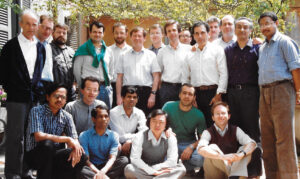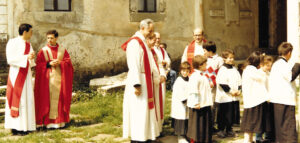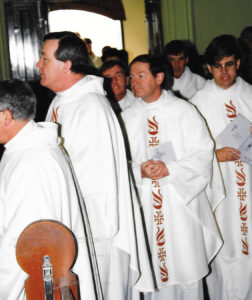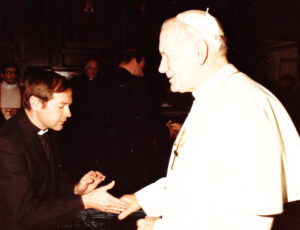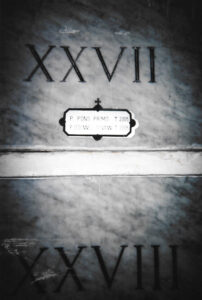Faculty of Theology 1984-1994, Dean of Theology, Pontifical Gregorian University
by Sr Anne O’Donnell, SND
My brother John J. O’Donnell S.J., known to his family and friends as “Jack,” was a faithful son and brother. He wrote cheerful, informative letters to his mother Marie in Baltimore County from his entry into the Jesuits in 1962 until she was diagnosed with macular degeneration in 1992. After then, he sent Mother brightly-colored greeting cards. Mother died at the age of ninety on St. Patrick’s Day, 2003. Jack also wrote to me his sister Anne in Washington, D.C. from 1976, when he went to Oxford and Tübingen for doctoral studies, until 1992. After then, we exchanged greeting cards and many e-mails, but the latter were practical not reflective. In this brief biography, I will focus on Jack’s years in Rome: 1984-1994 and 2001-2005. (Between 1994 and 2001, Jack was Rector of the Weston Jesuit School of Theology in Cambridge, MA for six years followed by a year’s sabbatical in Glasgow.)
Jack’s letters demonstrate his devoted service to the international Gregorian University as a teacher, dissertation director, and Dean of the Faculty of Theology. The international dimension of the “Greg” was evident from Jack’s first semester of teaching in Rome. Then he wrote of the distress of the students at the assassination of Prime Minister Indira Gandhi (Oct. 31); the murder of Fr. Jerzy Popieluszko, vocal supporter of the labor union Solidarity (Oct. 19); the attempted assassination of Prime Minister Margaret Thatcher by the Irish Republican Army (Oct. 12); and the ongoing military dictatorship of Augusto Pinochet (to MOD, 2 Nov. 1984).
I was impressed by Jack’s diligent preparation for his undergraduate lecture course on the Trinity, given in Italian. For his class of two-hundred students he prepared a one-page summary for each session in English and Italian (to AOD, 1 Mar. 1985). At first he concentrated on Augustine and Aquinas, but then he varied his material from year to year, once adding Basil, Bonaventure, and John Paul II–“to keep it fresh” (to AOD, 7 Feb. 1987). He also gave seminars, sometimes in English and sometimes in German, for example, on Karl Rahner (to AOD, 2 Nov. 1984); and on Hans Urs von Balthasar (to AOD, 30 May, 1987). Jack also learned French and Spanish so he could correct written exams and participate in oral exams in the five official languages of the Greg. The newsletter, Jesuits in Europe, noted that, at the time of his death, Jack was directing twenty-one graduate students in licentiate (master’s) theses or doctoral dissertations.
Writing books, articles, and reviews was an important part of Jack’s role as a university professor. Of his seven books, my favorite is A Faith You Can Live With, 1999,because I admire the way he composed it. This book grew out of his experience of giving retreats and adult education classes to lay people, usually in England during the summer. He assembled these individual talks on The Catechism of the Catholic Church, 1994, and integrated them into a book. In her old age, Mother could not read Jack’s book because she was legally blind so the Eucharistic minister read her a few pages at every visit to the health care center in Petersburg VA, near her other son Phil. In a letter of condolence (22 April 2005) after Jack’s death, Christopher Derby S.J., Director of Vocations, wrote that the Maryland and New York Provinces were giving this book to young men preparing to enter the Jesuits.
During his tenure as Dean of Theology (2003-2005), Jack wrote little to me about his personal experiences. But earlier, when his friend Jared Wicks S.J. had been elected dean, Jack made a judicious assessment that fits them both: “He will be good, I believe, he has good standards, at the same time he is very calm. The dean has a lot of contact with students, so it is important to have someone personable” (to AOD, 14 July 1991). A characteristic feature of Jack’s deanship was the unlocked door between his office and the corridor. According to the journalist Robert Mickens, “His Jesuit confrères advised him against having an open-door policy as dean, but – politely – he chose not to follow their fraternal advice” (“Letter from Rome,” The Tablet,” 16 April 2005, p. 340). Rick Curry S.J., his friend from novitiate days, explained, “Jack was always opening doors.”
In addition to his responsibilities at the Greg, Jack gave much service elsewhere. From 1984 to 1994, he lived in the Jesuit community at the College of the Gesù (for seminarians in pre-ordination theology) There he was spiritual father for six years and prefect of studies for four years (Report from Rome, July 2003). Throughout those ten years he celebrated Sunday Mass in Passo Corese, a town 35 kilometers (about 22 miles) north of Rome, and Christmas and Holy Week in San Giovanni Valdarno near Florence (to MOD, 2 Nov. 1984). For four years (1985-1988) before the new school year opened, Jack led retreats in Sicily for Jesuit scholastics. Also, during Advent 1986 he gave three lectures on the Trinity to Education for Parish Service (EPS), a program sponsored by my religious order for English-speaking lay women in Rome (1985-2011) (to MOD, 19 Dec. 1986). On 18 Oct. 1993, he was appointed spiritual father at the Collegio Capranica, the oldest seminary in Rome, founded in 1457. He also gave occasional pastoral service to students of the English, Scots, and German Colleges. From 2001 to 2005 Jack lived in the Bellarmino (for newly ordained priests in licentiate and doctoral studies). In his last period in Rome, Jack seemed to me to be more focused on his ministry at the Greg.
I am blessed to have had three notable visits to Rome. In 1989 during a sabbatical, I spent the first two weeks of June in Rome. (The massacre at Tienanmen Square, Beijing occurred on 4 June.) Jack arranged a series of pilgrimages in which we visited the shrines of saints representing diverse schools of Catholic spirituality. Lawrence Murphy S.J., the rector of the Gesù, drove us to Subiaco for Benedict. On separate days we took a coach to Assisi for Francis and Clare and to Siena for Catherine, the latter trip with Agnes McBryan SND of EPS. Back in Rome we visited Sant’Augustino for Monica’s tomb and the Cornaro Chapel of S. Maria della Vittoria for Bernini’s statue of “Teresa in Ecstasy.” In the Church of the Gesù we saw the relic of Francis Xavier and the tomb of Ignatius Loyola.
Those were glorious days, but my visit in 2005 was sorrowful because Jack was dying. From Washington D.C., I arrived in Rome on Good Friday while Jack was still conscious. As his older sister, I wanted to strengthen and encourage him so I said, “The Jesuits have given you a world-class education, and you have used all of it to help people.” His face lit up with joy. From Petersburg VA, our brother Phil, his wife Joan, and their four young adult children arrived on Easter Sunday. (Late in Holy Week, it took extra time to get six tickets to Rome on the same airplane.) The Jesuits gave Jake an Easter basket on his birthday; they took Katie, an art history major, to see Caravaggio’s “Calling of Matthew” in San Luigi dei Francesi; they took Kevin, a student of Latin, to the Coliseum; and they translated the medical conversations between the doctors at the Gemelli Hospital and Phil a neurologist. The Jesuits in Rome celebrated the funeral Mass for Jack on 31 March and a memorial Mass for the students on 7 April, both at Sant’Ignacio. Our family was not able to attend these Masses, but we were consoled by the knowledge that Jack had such a good influence on so many.
In 2010, after attending a Renaissance conference in Venice, I met up in Rome with my niece Brighid, who lives in London. Robert Geisinger S.J. of the Jesuit Curia
took us to the cemetery of Campo Verano. As we approached the Jesuit mausoleum, construction signs blocked our way. I heard the priest exclaim, “… Washington e Londra!” and the workman answer, “… minuti!” So we entered the mausoleum, found Jack’s tomb, touched his nameplate, and said a prayer. In the spirit of Peter and Paul, Jack had traveled from a distant land to work and die in Rome.
John J. O’Donnell S.J. was born on the feast of the Elizabethan martyr St. Edmund Campion S.J. (1 Dec. 1944) and died on the anniversary of the death of the eminent theologian Karl Rahner S.J. (30 Mar. 2005). I make an annual donation to the Gregorian University in memory of this devoted priest-professor. I want new generations of students to come to the Greg to be enriched by the spiritual and intellectual traditions of the Catholic Church, to make international friendships, and to prepare themselves to be pastoral leaders in their home countries.
[Footnote] I am grateful to Jared Wicks S.J. for providing much information about life at the Gregorian University. Jack recommended him to me as the co-editor of William Tyndale’s Answer to Sir Thomas More’s Dialogue, 2000. I focused on the English and French annotations; Jared on the Latin and German.



